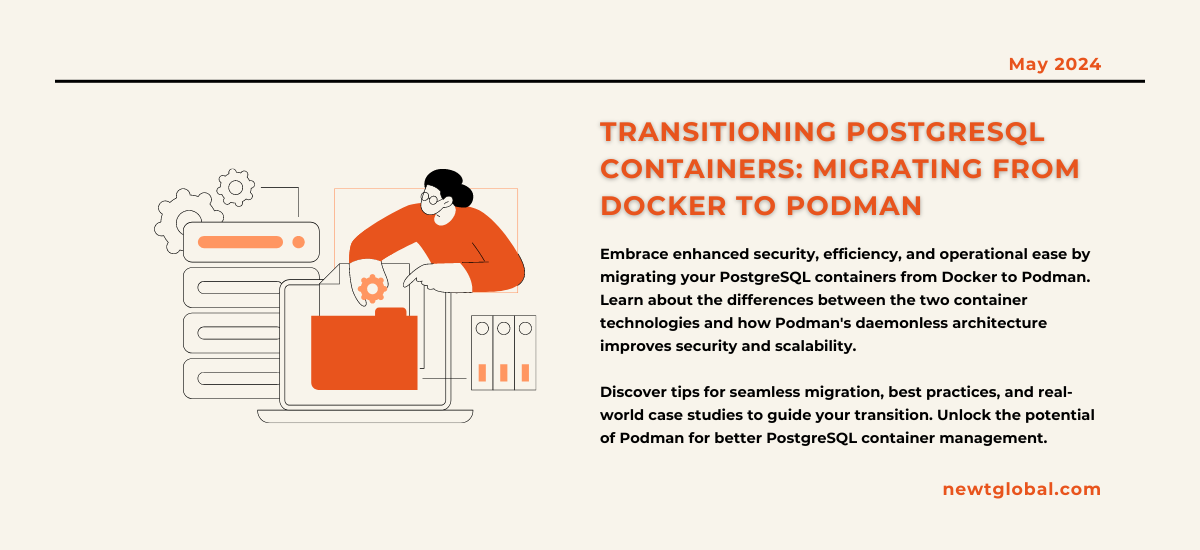
In the world of container technology, Docker and Podman are two important tools for developers and system administrators. Docker is well-established and makes it easy to deploy applications within containers. On the other hand, Podman is newer and focuses on security, scalability, and ease of use without needing a central daemon for container operations.
Differences Between Docker and Podman:
-
- Architecture:
-
- Docker works like a team with a main leader called the Docker daemon. The Docker client talks to this leader to create, start, and handle containers. This setup can be risky because if the leader has a problem, everything stops.
- On the other hand, Podman doesn’t need a leader. Each time you tell Podman to do something, it creates a new container without relying on a central leader. This is safer because there’s no single point that can cause trouble. It also makes managing the system easier because you don’t have to deal with a separate leader program.
-
- Rootless Containers:
-
- Podman lets users run containers without needing special permissions (rootless). This makes things safer because it reduces the chances of security problems in containers. Docker can also do rootless containers, but how it works might be different from how Podman does it, which is simpler.
-
- Operating without a Daemon:
-
- Docker needs its daemon to run all the time to manage containers. This reliance can slow things down and cause performance issues.
- On the other hand, Podman doesn’t need a daemon. It handles containers directly through its command-line interface (CLI). This makes system management easier and uses fewer resources, which is especially helpful in environments with limited resources or strict security needs.
-
- Storage and Network Handling:
-
- Docker usually deals with storing things and handling networks using its main program called the Docker daemon. Sometimes, this way of managing things can cause problems with how storage space is used and with setting up networks.
- Podman handles storage and networks differently. It directly manages these things while containers are running. This gives more freedom to control storage, networks, and how containers work over time. This way of managing things is spread out and helps avoid conflicts, making it easier to scale up when needed.
Advantages Podman Offers Over Docker
-
- Better Security: Podman’s approach reduces vulnerabilities by not needing a central daemon.
- Efficient Resource Usage: Podman uses resources more efficiently by avoiding a central daemon.
- Direct Container Lifecycle Management: Podman lets users control containers directly, without relying on an intermediary daemon.
- Rootless Container Support: Podman easily supports running containers without root access, improving security.
Tips for Migrating PostgreSQL Containers:
-
- Tools and Strategies for Seamless Migration
Helping with the changeover are tools like podman-docker. They provide a CLI interface that works like Docker’s, making it easier to learn and modify scripts.
-
- Best Practices for Optimal Containerization
Using Podman’s features like auto-updates and rootless containers improves security and makes operations more efficient. Also, making storage and network settings better can make everything work faster.
-
- Addressing Common Migration Challenges
To overcome common migration problems, it’s important to study Podman’s guides and talk to others in the community. This will help you solve issues like differences in port setup and managing storage space.
Testing and Validation Protocols
-
- The Need for Thorough Testing
It’s really important to test PostgreSQL containers well to make sure they work right without slowing down or having problems.
-
- Validation Techniques for Seamless Migration
Using testing tools and real-life situations helps check if moving data works well, focusing on making sure the database stays correct, connections are stable, and everything runs fast.
Real-world Case Studies
-
- Big Company Switch: A really large company that uses a lot of computer systems decided to change how they run their database systems. They moved from using something called Docker to something else called Podman. They did this because Podman is safer and easier to manage. Thanks to Podman, they now meet safety rules better and don’t have to work as hard to keep things running smoothly.
- Startup Changes: A new, growing company wanted to make their computer systems better so they can grow quickly without spending too much money. They switched their database systems from Docker to Podman. This change helped them be more flexible and get their new products and services out faster.
- Government Upgrade: A government department that handles very important databases switched from Docker to Podman. They did this to protect their systems better against cyber attacks and make sure their operations can keep going smoothly. Podman fits well with the strict safety rules they need to follow and made it easy for them to switch without problems. This move helps them keep important data safe from new and changing threats.
Conclusion
Switching PostgreSQL containers from Docker to Podman has clear advantages in terms of security, efficiency, and ease of management. By planning carefully, testing thoroughly, and using the right tools, the transition can be smooth. As container technology advances, Podman is becoming a strong choice for managing containers effectively. Feel confident about making the switch and discovering the many benefits Podman can offer for your PostgreSQL containers.
Ready to transition your PostgreSQL containers from Docker to Podman and unlock enhanced security, scalability, and operational ease?
Explore the benefits of Podman’s daemonless architecture and decentralized approach to container management.
Contact us at marketing@newtglobalcorp.com or visit newtglobal.com to learn how Newt Global DMAP can support your migration journey.
Newt Global DMAP is a world-class product enabling mass migration of Oracle Db to cloud-native PostgreSQL faster better and cheaper.
